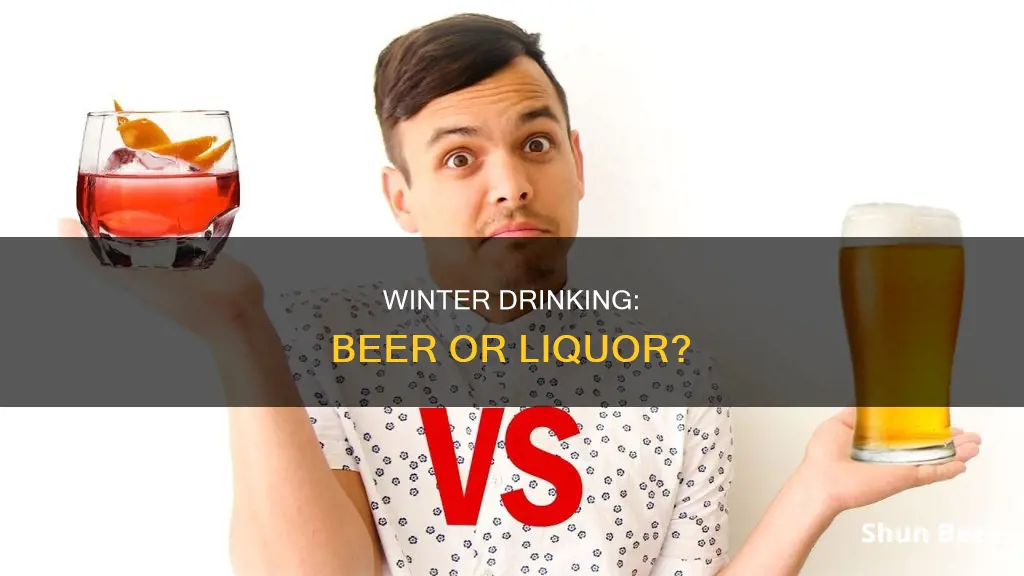
Drinking alcohol in cold weather can be dangerous. Alcohol can give you a false sense of warmth, as it makes blood vessels near your skin open up, with more blood flowing into them and creating a feeling of warmth on your skin. However, this blood is being diverted away from your vital central organs, which can cause your core temperature to drop and lead to hypothermia. Alcohol also impairs your decision-making ability, so you might take off your jacket, sweater or gloves outside, increasing your hypothermia risk. Alcohol is also a diuretic, which means it will speed up dehydration, which can make you more prone to hypothermia.
| Characteristics | Values |
|---|---|
| Alcohol's effect on the body in the cold | Alcohol gives a false sense of warmth as it causes blood vessels to dilate, sending more blood to the skin. However, this pulls heat away from the body's core, vital organs, heart, and brain, increasing the risk of hypothermia. |
| Effect on decision-making | Alcohol impairs decision-making abilities, leading to a higher likelihood of taking risks, such as removing warm clothing, which can be dangerous in cold weather. |
| Effect on balance | Alcohol affects balance and the ability to judge surroundings, increasing the risk of tripping or falling, especially on icy surfaces. |
| Effect on hydration | Alcohol is a diuretic, leading to frequent urination and dehydration, which can further increase the risk of hypothermia. |
| Effect on immune system | Excessive alcohol consumption weakens the immune system and increases the risk of infections. |
| Effect on congestion | Alcohol may lead to increased nasal congestion, contrary to the belief that it acts as a decongestant. |
| Effect on medication | Alcohol can cause adverse side effects when combined with certain cold medications, intensifying their side effects, such as drowsiness. |
What You'll Learn

Alcohol may increase the risk of hypothermia
The more alcohol you drink, the more your body temperature drops. This is because the magnitude of the reduction in body temperature is related to your blood alcohol concentration. This means that binge drinking is especially dangerous in cold weather.
Alcohol also impairs your decision-making ability, which can be deadly in cold weather. You may be tempted to shed layers or take unnecessary risks, such as walking long distances in the snow, that you wouldn't take while sober.這 is especially true if you are doing strenuous exercise in the cold, as alcohol has been shown to enhance heat loss in these situations.
Alcohol also dehydrates you, which can make you more prone to hypothermia. This is because alcohol is a diuretic, which means that the more you drink, the more you will need to urinate. Dehydration makes it harder for your body to regulate its temperature effectively.
Finally, alcohol reduces your perception of cold air temperatures and can lessen your natural responses to cold, such as shivering, that are designed to help you stay warm. This can put you at greater risk of cold weather injuries, such as frostbite.
Drinking 12 Beers Daily: How Long Can You Survive?
You may want to see also

Alcohol impairs your decision-making ability
Alcohol-dependent individuals, for instance, have been found to exhibit poor decision-making abilities in laboratory settings. They tend to make more choices that bring immediate reward but lead to more severe delayed punishment. This is because alcohol affects our ability to think, plan, and reasonably evaluate situations, potentially leading to increased sexual risk-taking, such as having multiple sexual partners or sex without a condom.
Alcohol also impairs our ability to judge our surroundings, increasing the likelihood of tripping or falling, especially on icy pavements. It can also make us more prone to hypothermia, as it gives us a false sense of warmth while lowering our core body temperature. This can be extremely dangerous, especially if you have heart problems, as it can lead to increased heart rate and the risk of arrhythmias.
In addition, alcohol can cloud our judgement and make us more likely to engage in violent or aggressive behaviours. Studies have shown that a high percentage of homicide offenders, sexual offenders, and men involved in marital violence were drinking at the time of the offence.
Overall, while small amounts of alcohol may be seen as beneficial in social situations, it's important to understand that alcohol can impair our judgement and decision-making abilities, leading to negative consequences for our health and well-being.
Is It Safe to Drink Week-Old Beer?
You may want to see also

Alcohol can cause dehydration
Drinking alcohol can lead to dehydration, which occurs when the body does not have enough fluids to function effectively. Alcohol is a diuretic, meaning it increases the frequency of urination. This diuretic effect is due to alcohol suppressing the release of the antidiuretic hormone vasopressin, which normally signals the kidneys to reabsorb and retain water. As a result, more water is lost through urination, leading to dehydration.
The risk of dehydration is particularly high when drinking alcohol on an empty stomach. In the absence of food, alcohol is absorbed directly into the bloodstream through the stomach lining and small intestine. This direct absorption into the bloodstream contributes to faster dehydration. Additionally, drinking alcohol can suppress appetite, further reducing the likelihood of eating while drinking and slowing down alcohol absorption.
To counteract alcohol-induced dehydration, it is important to consume alcohol in moderation and to drink water alongside alcoholic beverages. It is recommended to have at least one glass of water for each serving of alcohol. This helps to replenish fluids and maintain hydration. It is also crucial to be aware of the signs and symptoms of dehydration, especially when consuming alcohol.
However, it is important to note that recent research has challenged the belief that alcohol causes dehydration. Some studies suggest that while the initial alcoholic drink may lead to increased urination compared to drinking water, subsequent drinks do not result in a significant increase in urine output. These findings indicate that alcohol may not have as strong a diuretic effect as previously thought.
Regardless of the ongoing research, it is always advisable to drink responsibly and in moderation. Excessive alcohol consumption can lead to dehydration and other negative health consequences.
Beer and Six-Pack Abs: Can They Coexist?
You may want to see also

Alcohol may reduce the number of colds
There is limited evidence that drinking a small amount of alcohol may reduce the number of colds people get per year. However, it is important to note that excessive alcohol consumption is highly damaging to human health and increases the risk of infection.
The Evidence
A 2012 retrospective study of 899 Japanese men found that those who drank alcohol frequently were less likely to experience common cold episodes. The study also found that the frequency, not the amount, of alcohol intake was significantly related to a lower prevalence of self-reported common cold episodes.
Similarly, two European studies found an association between alcohol intake and a reduced incidence of common cold symptoms.
Possible Explanations
It is suggested that moderate alcohol consumption may decrease the number of colds due to its influence on the immune response. Alcohol may enhance immune function by releasing inflammatory cytokines, which can be beneficial for fighting infections in the short term.
Additionally, alcohol intake may increase airway temperature, creating an unfavourable environment for cold-causing viruses. Alcohol consumption improves skin, cerebral, and coronary blood flow, which may contribute to increased airway blood flow and temperature.
Caution
It is important to note that the potential benefits of alcohol consumption in reducing the number of colds are not conclusive and require further research. Excessive alcohol consumption can have negative effects on health and increase mortality. Therefore, it is crucial to consume alcohol in moderation and prioritize overall health and well-being.
Chugging 24 Beers Daily: A Deadly Affair
You may want to see also

Alcohol may increase the risk of infection
Physicians have recognised for over a century that alcohol use is associated with infections, and that alcoholics are especially at risk for pneumonia. William Osler, the father of scientific medicine, reported in 1905 that patients who misused alcohol had a higher predisposition to pneumonia. Since then, numerous studies have provided important epidemiological data demonstrating a link between alcohol consumption and the risk of infection.
Alcohol has a systemic effect on every organ, and its impact on the immune system is well documented. For example, alcohol produces abnormalities in the host defences, affecting the gut, lung, and skin mucosal immunity.
- Effects on mucosal gut (intestinal) immunity: The intestinal mucosa plays a crucial role in alcohol metabolism, as it incorporates alcohol into the bloodstream. Acute alcohol binge drinking can lead to higher expression of serum bacterial DNA and increased endotoxin levels in the serum, which can cause abnormalities in the gut epithelium. Alcohol also increases intestinal permeability, allowing bacteria or microbial products to translocate from the gut into the bloodstream. This can lead to higher levels of lipopolysaccharide, a molecule found in the outer membrane of Gram-negative bacteria, in the blood.
- Effects on mucosal lung immunity: Alcohol intake undermines immune defences in both the upper and lower airways. It affects the function of alveolar macrophages, which are important immune cells in the lungs. Alcohol decreases the membrane expression of the GM-CSF receptor and impairs bacterial ingestion by alveolar macrophages. It also activates NADPH oxidases, which can produce reactive oxygen species that damage tissue and impair alveolar function.
- Effects on mucosal skin immunity: Alcoholism is associated with higher rates of wound infection and delay in wound closure. It impairs dermal fibroblast function, which is important for wound healing. Alcohol also decreases the number of epidermal immune cells (Langerhans cells) and affects skin T-cell populations, particularly those that express the γδTCR receptor.
In summary, alcohol can increase the risk of infection by damaging the immune system, particularly the mucosal immunity of the gut, lungs, and skin. It affects the function of important immune cells, increases intestinal permeability, and impairs wound healing. These factors can lead to a higher susceptibility to infections, including respiratory infections such as tuberculosis and pneumonia.
Should You Drink Frozen Beer?
You may want to see also
Frequently asked questions
Drinking alcohol in cold weather can be dangerous. Alcohol can give you a false sense of warmth, increasing your risk of hypothermia. It also impairs your decision-making ability, so you might take off your jacket, sweater, or gloves and increase your risk of cold exposure.
When you drink alcohol, your blood vessels dilate, sending more blood to your skin and creating a sensation of warmth or flushing. However, this pulls heat away from your body's core, vital organs, and brain, causing your body temperature to drop.
There is some evidence that drinking a small amount of alcohol may reduce the number of colds people get per year. A 2012 study found that participants who drank 1 to 2.5 drinks per day were less likely to experience the common cold. However, more recent and large-scale studies are needed to confirm this.
Drinking alcohol in the cold can increase your risk of hypothermia, impair your decision-making ability, and affect your balance and judgment of your surroundings. It can also dehydrate you, as alcohol is a diuretic and can speed up dehydration. Additionally, combining alcohol with certain cold medications can intensify their side effects, such as drowsiness or dizziness.
If you choose to drink in cold weather, it is important to take some safety precautions. Eat fatty or high-carb foods before drinking, alternate alcoholic and non-alcoholic drinks, and wear warm clothing and dress in layers. Stay with a group of friends and plan how you will get home. Avoid drinking excessively, as binge drinking has many health risks.







